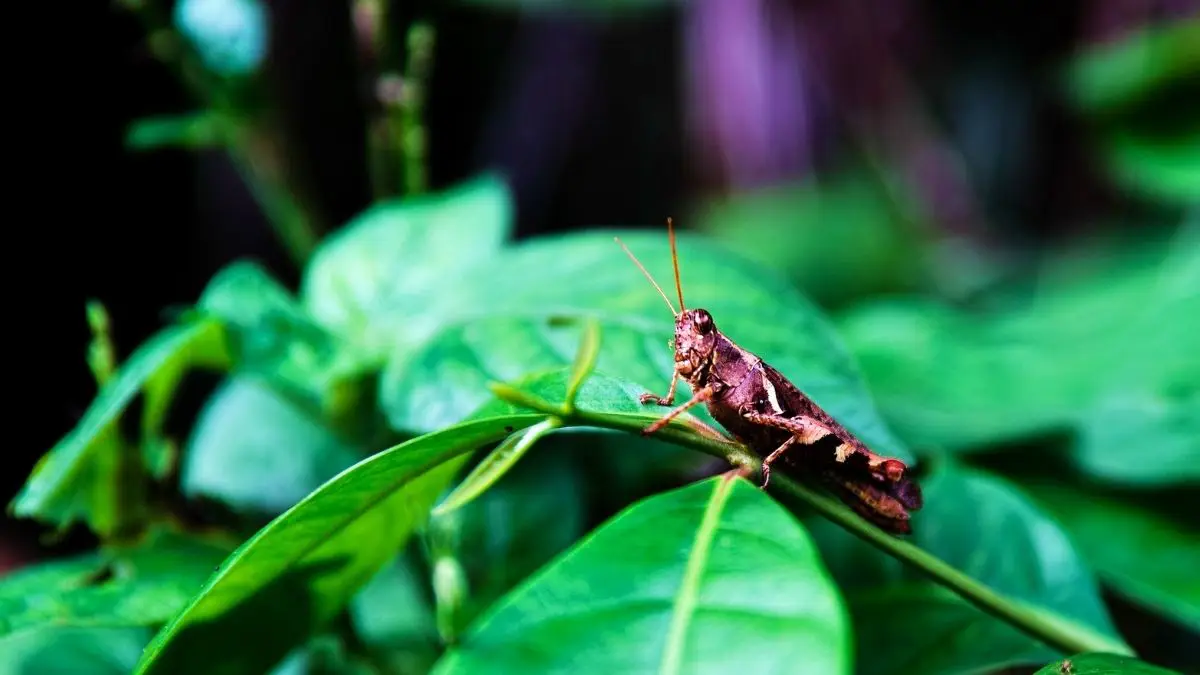Answer: It depends. The simple answer would have been no since vegans don’t eat animals. However, there is no definite answer to this because it all comes down to individual opinions.

Eating Insects – The Full Story
Feeling hungry? Why not try out some spicy grasshoppers and buffalo worms? The thought of it alone might seem irritating and gross to you.
Who eats insects anyway?
This might sound gross and disgusting to some people, but the truth is, we all eat bugs without our knowing.
According to Layla Eplett at the Scientific American Blog, an individual unknowingly ingests about 1 to 2 pounds of maggots, flies, and other types of bugs every year.
A lot of bugs are harvested and packaged alongside our crops. Staples like broccoli hops and canned tomatoes contain insect fragments and sometimes the whole insect. Even the Food and Drug Administration (FDA) knows all the bugs cannot be completely removed, so they limit the number of bugs you unknowingly eat.
However, whether vegans can eat insects or not depends on your reasons for being a vegan. Some people’s motivation is health-related issues; for others, it’s animal cruelty or environmental conservation.
Can Vegans Eat Insects?
There are three primary motivations for why people go vegan. It could be for personal health, environmental sustainability, or to combat animal cruelty.
Now, let’s consider why vegans should support eating insects from these perspectives.
- Personal health: Most edible insects contain healthy fats, all essential amino acids, minerals, and vitamins. The vegan diet is often critiqued for lacking essential nutrients and vitamins like B-12 and D. Insects can be a natural source of these nutrients in your diet.
- Environmental sustainability: Insect farming is far more sustainable and environmentally friendly than meat farming. Insect farming requires less arable land, feed, and water than meat farming. Insects can also thrive on foods unsuitable for humans or animals. It means they convert waste into food. Even if a vegan would not choose to eat bugs for some reason, it will be a step in the right direction to support this. This would move many meat-eaters away from meat consumption and towards something more sustainable and environmentally friendly.
- Animal cruelty: Vegans don’t eat animals to combat animal cruelty. Even though insects are categorized as animals, most people don’t consider their animals in the real sense. Some studies have shown that insects don’t feel pain, so there is no concern about animal cruelty when it comes to insects.
If any of these reasons is why you are a vegan, then eating or supporting the eating of insects is not bad after all. It does more good than harm.
Health Benefits of Insects
The practice of eating insects across the globe is mainly for its nutritional benefits.
Yes, insects are very nutritious. Some studies claim that insects are more nutritious than meat or beef. They are low in carbohydrates and highly rich in protein, iron, healthy fats, vitamins, and minerals.
Depending on the type of insects and development stage, an insect’s protein content is between 20 – 75% of dry matter.
A 3.5 oz of grasshopper yields about 14 to 28 g of protein. It translates to about 25 – 60% of the recommended daily requirement. The same 3.5 oz portion of red ants also contains about 14 g of protein, equivalent to 71% of the recommended daily iron requirements.
Insects are highly nutritional and very low in calories. This is why some researchers suggest it is a more effective way to combat obesity or related diseases.
Insects also contain vitamins and minerals like B12, manganese, iron, and calcium. B12 helps to improve bone health and increase energy levels. Manganese is essential for maintaining the brain and nervous system, while iron aids red blood cell production. Calcium is also a vital nutrient for the development of strong bones.
The prebiotic fiber in insects aids digestion and gut health.
Edible Insects to Consider
Beetles are one of the most common edible insects. Others are bees, caterpillars, wasps, grasshoppers, ants, crickets, and locusts.
There are over 2000 edible insects with diverse taste profiles and benefits to human health.
Here are some common edible insects you can try out for your next meal!
Crickets and Grasshoppers
These are the most commonly consumed insects across the world. The reason is they are abundant and easy to catch. They are also very rich in protein. You will often find crickets at night and grasshoppers during the day. Crickets are very high in B12. 10 g of cricket powder is enough to cover 100% of the daily requirement of vitamin B12.
Ants
Ants are also very abundant in the woods. You use a sweet bait to lure them, and you will see them trooping out in their numbers. You should boil them before eating to neutralize the acid they use to subdue their predators. However, you can eat them raw if you don’t mind the sour taste.
Earthworms
The thought of it might sound disgusting, but it’s worth trying. Earthworms are also very abundant. Flip a rock or dig into damp soil, and you will find them. Worms feed on dirt, so you should boil them to remove the contents of their digestive tract. Afterward, you can roast them or leave them to dry. Dried worms can be ground into a nutritious powder to supplement your meals.
Cockroaches
The sight alone makes most people cringe. Cockroaches are an essential food source in the wild. Birds, small mammals, and people eat them. You can also try it – boil them, then roast or fry them.
Bees and Wasps
You need to use sweet bait to trap the bee. After collecting the bees, ensure you remove the stinger before you consume them. You can roast the bees, eat or grind them into powder, and use them as supplements for your meals.
Dragonflies
Dragonflies are not just beautiful to look at but also tasty to eat. You can find dragonflies during the summer over freshwater pools, lakes, and ponds. In the spring, you will find their larvae, which are edible as well. The larvae can be fried directly and eaten, but you should remove the wings and fry only the adult’s body.
Termites
Termites have the most calories – they contain about six calories per gram. These calories are obtained mostly from their protein contents and heart-friendly fats. Termites feed on wood so that you can find them in stumps and rotten pieces of trees. Termites can be eaten raw, fried, or roasted.
Vegan Alternatives
Despite the health benefits of eating insects, some vegans might still feel it is gross and disgusting. So, for those who can’t get themselves to eat insects, here is an alternative for you.
As a vegan, you definitely can’t eat meat; if you don’t want to eat insects, you can consider going for lab-grown meat.
What Is Lab-Grown Meat?
Lab-grown meat is also referred to as clean meat or cultured meat.
Scientists have found a way to synthesize meat in the laboratory without harming animals. Once enough muscle fiber has been formed, meat resembles regular meat derived from animals.
Scientists take the stem cells of an animal to begin the process of creating cultured meat. The cells are placed in a petri dish where carbohydrates and amino acids are added to aid the growth and multiplication.
Lab-grown meat is relatively new, and it’s a good thing, especially for vegans. Lab-grown meat could be the future of meat.
People who have tried it out say it’s delicious, and they can’t even tell the difference between real livestock meat and lab-grown meat.
Technically, lab-grown meat is just like real meat. However, it does not involve animal cruelty in any form.
Is Lab-Grown Meat Healthy?
Lab-grown might even be healthier than standard livestock meat. It is because there is no saturated fat or growth hormone. Research shows that regular meat can lead to a higher risk of diabetes, heart disease, or cancer.
Lab-grown meat is produced in a sterile environment, while slaughterhouses are not sterile and, therefore, more prone to contamination. This can lead to foodborne illness, which can be avoided with lab-grown meat.
Lab-grown meat does not involve any genetic modifications and is also free from artificial growth hormones that make livestock grow quickly.
Lab-grown meat is beneficial not only to our health but also to the environment and animals.
Final Thoughts
The question of whether to eat insects or not is a personal decision to make. However, if your motives are health-related or environmental, there is no harm in giving them a try.

